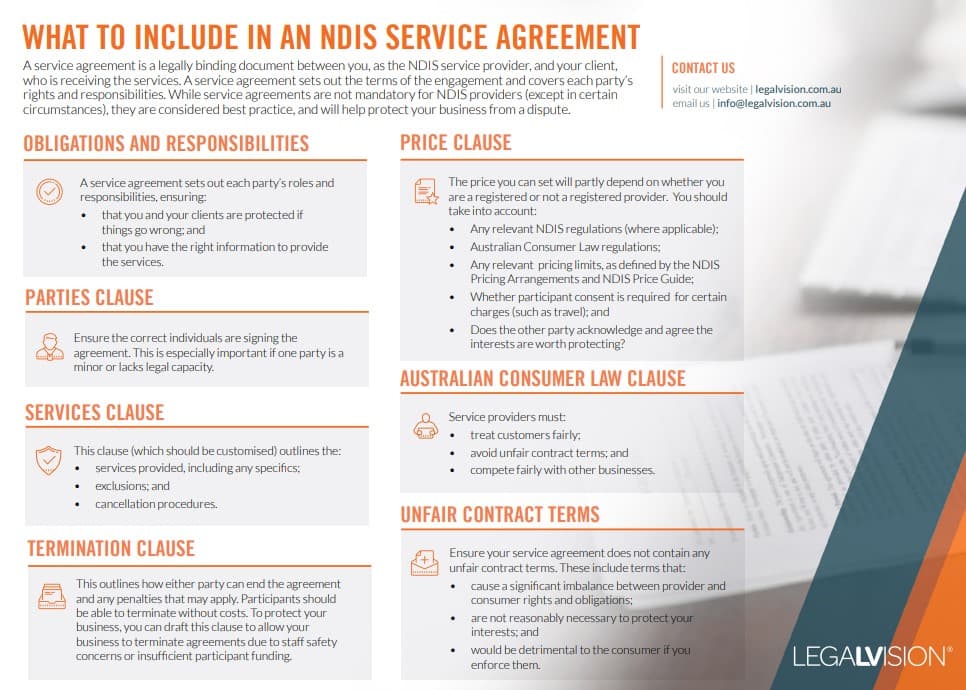If you intend to provide services to NDIS participants, it is essential to have a clear understanding of your legal requirements before doing so. Different legal requirements will apply depending on the type of services you provide and the type of service provider you are, that is, registered or unregistered. This article outlines the steps required to provide services to NDIS participants. This includes registration and compliance, pricing and payment and developing service agreements.
1. Understand the NDIS
Before becoming an NDIS service provider, it is essential to understand how the NDIS works.
The NDIS website is a valuable starting point. It will help you grasp the fundamental principles, eligibility criteria, and objectives of the scheme.
It is important to note that you may also need to comply with other specific state and territory laws, depending on where you are located.
2. Registration and Compliance
You may choose to provide services to NDIS participants as a registered provider or an unregistered provider.
It is important to note that only a registered NDIS provider can provide services to NDIS participants who are NDIS-managed. While all providers must comply with certain rules, NDIS providers must meet and maintain additional requirements.
If you decide to provide services as a registered provider, the registration process involves several steps. Let us explore these further below.
Determining Your Provider Category
Choose the category that aligns with the services you intend to offer. Categories may include:
- support coordination;
- personal care;
- accommodation; and
- therapy.
Meeting Compliance Standards
You will need to complete a self-assessment against the NDIS Practice Standards relevant to the supports and services you plan to deliver and upload any documents as evidence.
Applying for Registration
You must apply through the NDIS Commission’s online portal. Ensure you provide all necessary documentation and information.
Selecting an Approved Auditor and Undergoing an Audit
After you submit your online application, you will receive an ‘initial scope of audit’ document via email from the NDIS Commission. This email will outline:
- whether you require a ‘verification’ or ‘certification’ audit; and
- what you need to demonstrate to comply with the relevant NDIS Practice Standards.
It is your responsibility as the applicant to engage an approved quality auditor to undertake the audit. Once you have selected an auditor, the auditor will work with you to help you understand the findings and give you the opportunity to ask and answer any questions.
Assessment and Certification
The NDIS Commission will review your application and conduct an assessment to determine if you meet the required standards.
Continue reading this article below the form3. Pricing and Payment
You must familiarise yourself with the NDIS Price Guide and Support Catalogue, whether you are a registered or unregistered NDIS provider. This guide outlines the maximum prices you can charge for various services. It is essential to ensure the prices you ask for are in line with the NDIS Price Guide.
Note that there are separate pricing arrangements if you provide assistive technology or specialist disability accommodation services.

This fact sheet will help you to identify the key terms you must include in your NDIS service agreement.
4. Develop Service Agreements
Whether or not you decide to become an unregistered or registered NDIS provider, developing service agreements to outline the services you will be providing to NDIS participants is recommended. Your service agreements should detail the following:
- the services you will provide;
- the cost; and
- terms and conditions.
This ensures participants understand their rights and responsibilities in the agreement and maintain clear records of the services delivered.
5. Reporting and Compliance for Registered Providers
Complying with NDIS regulations and quality standards is necessary to maintain your provider status. If you provide services as a registered provider, there are obligations that you will need to fulfil, including undertaking audits and carrying out worker screenings regularly. You should regularly check the NDIS website for any updates or changes to your compliance requirements.
6. Continuous Improvement
Seeking regular feedback from participants is integral to ongoing improvements in your services. Such feedback can be useful for you and your business. Use this feedback to make necessary adjustments to your service delivery and quality standards.
Key Takeaways
Ultimately, whether you decide to become a registered or unregistered NDIS service provider, you must understand the respective steps involved for each before officially delivering services to participants. In doing so, you will have a useful framework for understanding the obligations required on your end to provide services safely and legally to NDIS participants.
If you require advice on the NDIS services you intend to provide, our experienced NDIS lawyers can assist as part of our LegalVision membership. For a low monthly fee, you will have unlimited access to lawyers to answer your questions and draft and review your documents. Call us today on 1300 544 755 or visit our membership page.
We appreciate your feedback – your submission has been successfully received.











